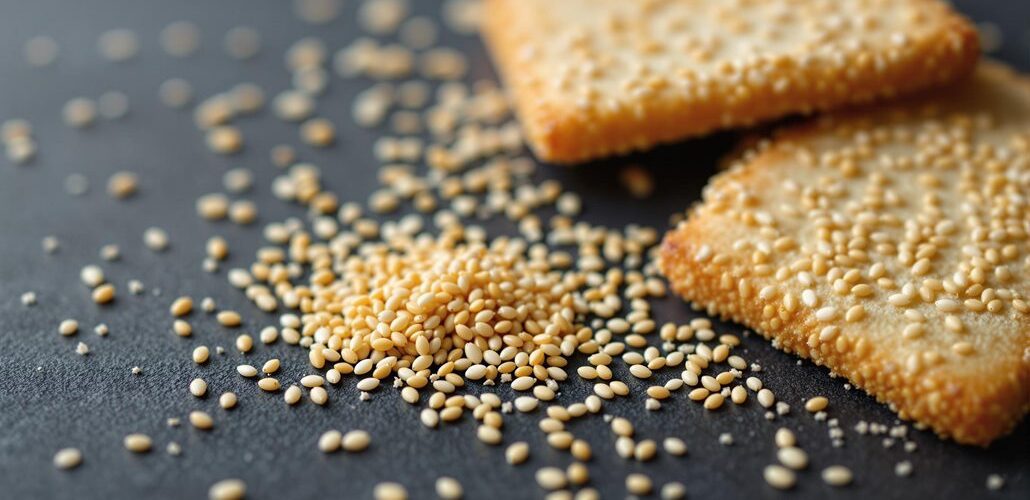
Sesame seeds can fit into a ketogenic diet when consumed with care due to their moderate carbohydrate content, approximately 1g net carbs per tablespoon. Their high-fat content (49.67g per 100g), particularly unsaturated fats, supports ketosis and cardiovascular health. Additionally, they offer substantial plant-based protein (17.73g per 100g), essential for muscle maintenance. However, the relatively high net carb content requires attention to portion sizes to avoid exceeding daily carb limits, which are critical for ketosis maintenance. By integrating sesame seeds thoughtfully, they contribute beneficial nutrients without greatly impacting carb intake. Further insights into their keto-friendly usage are available.
Key Takeaways
- Sesame seeds contain 11.65g of net carbs per 100g, requiring careful portion control on a keto diet.
- Limit sesame seed intake to 1-2 tablespoons daily to maintain ketosis.
- High in fats, sesame seeds support energy levels and ketosis adherence in ketogenic diets.
- Alternatives like chia and flaxseeds offer lower-carb options for keto-friendly meals.
- Sesame seeds can enhance flavor and texture when used as a garnish in moderation.
Sesame Seeds Nutritional Profile
Sesame seeds present a complex nutritional profile characterized by a high fat content, moderate protein levels, and a significant amount of carbohydrates, which can influence suitability for ketogenic diets.
Sesame seeds contain approximately 49.67g of fats per 100g serving, of which a considerable proportion is high in healthy fats, specifically polyunsaturated and monounsaturated fatty acids. These essential fats play a vital role in supporting cardiovascular health and maintaining ideal cell membrane integrity.
In addition to fats, sesame seeds contain 17.73g of protein per 100g, offering a moderate source of plant-based protein, which can support muscle maintenance and repair.
From a mineral perspective, sesame seeds are a potent source of calcium and magnesium, containing 975mg and 351mg per 100g, respectively. These minerals are essential for bone health, neuromuscular function, and numerous enzymatic processes.
The net carbs per 100g serving of sesame seeds measure approximately 11.65g, which may affect their inclusion in strict ketogenic diets. Despite the higher carb content, the dietary fiber present assists in moderating blood glucose levels.
The overall nutritional composition of sesame seeds, particularly their high fat and mineral content, underscores their potential health benefits beyond carbohydrate considerations.
Carbohydrate Content Analysis
Evaluating the carbohydrate content of sesame seeds is fundamental for those adhering to a ketogenic diet. With approximately 11.65g of net carbs per 100g, sesame seeds pose a challenge for individuals managing their carbohydrate intake. A typical serving size of 1 tablespoon (approximately 9g) contains about 1g of net carbs, necessitating precise portion control to maintain ketosis.
While the healthy fat content of sesame seeds is beneficial, their cumulative carbohydrate load can potentially surpass daily carb allowances, thereby compromising the low-carb diet's effectiveness. It's important to note that sesame seeds could affect blood sugar control due to their carbohydrate content, making them less suitable for those managing conditions like type 2 diabetes.
Net Carbs in Seeds: Sesame seeds contain moderate net carbs, making them a less ideal choice for strict keto adherents.
Serving Size Importance: Monitoring portion sizes is vital to prevent exceeding daily net carb limits.
Hidden Carbs: Sesame seeds may be present in various food products, inadvertently increasing net carb intake.
Alternative Options: Seeds like chia seeds or flaxseeds offer lower net carbs, providing better alternatives for a keto diet.
For those rigorously following a ketogenic lifestyle, it is paramount to be vigilant about sesame seeds' inclusion in meals and snacks. Opting for seeds with lower carbohydrate content can support adherence to the keto diet's principles.
Fat and Protein Benefits
Sesame seeds offer a substantial contribution to the ketogenic diet with their impressive profile of approximately 13 grams of healthy unsaturated fats and 5 grams of protein per ounce, making them a nutrient-dense choice.
The predominance of unsaturated fatty acids, such as monounsaturated fats, supports cardiovascular health and provides sustained energy, which is essential for maintaining ketosis.
In addition, their protein content aids in satiety and muscle preservation, aligning with the primary objectives of a low-carbohydrate, high-fat dietary regimen.
Healthy Fats Source
Given their impressive nutritional profile, sesame seeds emerge as a potent source of healthy fats, particularly advantageous for individuals adhering to a ketogenic diet. Boasting approximately 49.67 grams of fats per 100 grams, these seeds are rich in unsaturated fatty acids, aligning seamlessly with the goals of a keto lifestyle.
The consumption of such healthy fats is essential in maintaining ideal cholesterol levels, thereby supporting cardiovascular health. This makes sesame seeds a valuable inclusion in a high-fat diet, where the quality of fats consumed is significant.
The macronutrient profile of sesame seeds offers a favorable fat-to-protein ratio, enhancing their role in a ketogenic lifestyle. High-fat content, mainly from monounsaturated and polyunsaturated fats, not only provides sustained energy but also facilitates ketosis, a metabolic state essential for keto adherents.
Simultaneously, a protein intake of 17.73 grams per 100 grams contributes to muscle maintenance and satiety, important for overall dietary compliance.
- High unsaturated fatty acids: Promotes cardiovascular health and supports cholesterol balance.
- Energy-dense: Ideal for sustaining energy levels in low-carb diets.
- Ketosis facilitation: Helps achieve and maintain ketosis efficiently.
- Balanced macronutrient profile: Supports high-fat, moderate-protein dietary needs.
Protein Content Highlights
A powerhouse of nutrition, sesame seeds offer a robust protein content of approximately 17.73 grams per 100 grams, positioning them as an excellent plant-based protein source for those adhering to a ketogenic diet. This substantial protein content, coupled with a fat content of around 49.67 grams per 100 grams, renders sesame seeds a dual-purpose dietary component that meets both protein and healthy fat requirements essential for maintaining ketosis.
The high protein content in sesame seeds is particularly notable for its inclusion of essential amino acids, which are vital for muscle repair and overall health. For individuals following a ketogenic diet, these amino acids can enhance the muscle-building benefits typically sought from animal sources, providing an advantageous plant-based alternative.
Moreover, the synergy between protein and healthy fats in these seeds contributes greatly to satiety, thereby supporting weight management by prolonging the feeling of fullness. This attribute makes sesame seeds a strategic addition for anyone aiming to meet their daily protein and fat macronutrient goals while adhering to ketogenic principles.
Incorporating sesame seeds into a ketogenic diet not only aids in achieving nutritional balance but also supports broader health outcomes through their extensive nutrient profile.
Nutrient-Dense Attributes
The nutrient-dense profile of sesame seeds positions them as a valuable component in a ketogenic diet, primarily due to their substantial fat and protein content.
With approximately 49.67g of fats and 17.73g of protein per 100g serving, sesame seeds serve as an excellent high-fat snack that caters to the dietary principles of a keto diet. The fats primarily consist of unsaturated fatty acids, which are essential for sustaining energy levels and promoting overall health.
Importantly, these seeds offer a mere 2g of net carbs per ounce, solidifying their status as a low-carb option.
Incorporating sesame seeds into a keto regimen can yield multiple health benefits:
- Healthy Fats: The unsaturated fatty acids in sesame seeds are vital for energy maintenance and contribute positively to metabolic functions.
- Protein Intake: Aiding in satiety, the protein content helps manage hunger and supports muscle preservation.
- Low-Carb Option: With minimal net carbs, they align perfectly with low-carb dietary goals, facilitating ketosis.
- Overall Health: Their nutrient profile supports cardiovascular health and metabolic wellness, enhancing the holistic benefits of a keto diet.
Impact on Ketosis
The net carbohydrate content of sesame seeds, quantified at approximately 11.65g per 100g, presents a substantial consideration for individuals adhering to a ketogenic diet, where typical daily carb limits range from 20-50g.
To stay within these limits, understanding carbohydrate management is essential, as miscalculating net carbs can potentially disrupt ketosis.
Consequently, careful attention to serving sizes is vital, as even modest portions can considerably contribute to daily carbohydrate intake and potentially disrupt ketosis.
Therefore, individuals must strategically monitor and manage their sesame seed consumption to guarantee keto diet compliance and maintain the metabolic state of ketosis.
Net Carb Content
Understanding the net carb content of sesame seeds is vital for individuals adhering to a ketogenic diet, where maintaining low carbohydrate intake is essential for staying in ketosis.
Sesame seeds contain approximately 11.65 grams of net carbs per 100 grams, a carbohydrate content that can swiftly exceed the daily net carb limits for strict keto adherents. A typical serving of sesame seeds, approximately one tablespoon (9g), contains around 1 gram of net carbs, necessitating vigilant portion control to prevent exceeding the carbohydrate threshold essential for a keto diet.
Regular consumption without monitoring can result in cumulative carb intake, potentially disrupting ketosis.
When considering the inclusion of sesame seeds in a ketogenic regimen, it is advisable to account for:
- Daily Net Carb Limit: Stay within personal carb thresholds to remain in ketosis.
- Portion Control: Careful measurement of sesame seed servings to manage carb intake.
- Cumulative Carbohydrate Content: Monitor intake to avoid inadvertent ketosis disruption.
- Lower Net Carb Alternatives: Explore options like chia seeds or flaxseeds for reduced carb impact.
Serving Size Importance
Serving size's vital role in maintaining ketosis cannot be overstated, particularly when incorporating sesame seeds into a ketogenic diet. Given their net carbs content of approximately 11.65g per 100g serving, it is necessary to monitor portion sizes diligently. A single tablespoon of sesame seeds, weighing around 9g, contains about 1g of net carbs, offering a manageable option for those aiming to maintain ketosis.
However, regularly exceeding the recommended serving size can lead to surpassing daily carb allowances, thereby jeopardizing ketosis in individuals adhering to a strict ketogenic regimen.
To effectively manage sesame seed consumption, employing a keto calculator can be instrumental. This tool enables individuals to track macros and adjust their intake to remain within their net carb budget.
It is essential to remain vigilant about cumulative carb intake from all dietary sources, including sesame seeds, as even small servings can aggregate and impact overall keto adherence. Consequently, understanding the importance of serving size and precise portion monitoring is necessary for integrating sesame seeds in a keto-friendly manner.
Maintaining awareness of these factors guarantees that sesame seeds can be a viable addition to a ketogenic diet without disrupting metabolic goals.
Portion Control Tips
Effectively managing portion sizes of sesame seeds is important for individuals adhering to a ketogenic diet. A tablespoon of sesame seeds contains approximately 1g of net carbs, making portion control essential to maintain ketosis. Given that typical daily net carb limits on a keto diet range between 20-50g, it is advisable to limit sesame seed intake to 1-2 tablespoons per day.
This prudent serving size helps balance daily carb consumption and prevents exceeding the ketosis threshold. Monitoring cumulative net carb intake is significant, and utilizing a nutrition app can facilitate tracking not only sesame seeds but also other dietary components. Staying hydrated and maintaining electrolyte balance is critical to prevent keto flu, which can occur during initial adaptation to the keto diet.
Hidden sources of sesame seeds, such as tahini or certain baked goods, can inadvertently increase overall carb intake. As a result, remaining vigilant about these concealed additives is recommended to adhere to ketogenic guidelines.
Furthermore, if consuming sesame seeds, it is beneficial to pair them with lower-carb foods to maintain dietary equilibrium.
- Portion Control: Limit sesame seeds to 1-2 tablespoons daily to manage net carbs.
- Monitor Intake: Use a nutrition app to track total carb consumption.
- Hidden Sources: Be cautious of sesame seeds in tahini and baked goods.
- Balance Diet: Combine sesame seeds with low-carb foods.
Keto-Friendly Alternatives
While managing portion sizes of sesame seeds is important for those on a ketogenic diet, exploring keto-friendly alternatives can provide additional nutritional benefits while maintaining low carbohydrate intake.
Flax seeds are an exemplary low-carb substitute, containing merely 0.1g of net carbs per 7g serving. This makes them an ideal component for a keto diet, delivering healthy fats and essential nutrients without surpassing carb limits.
Similarly, chia seeds offer a mere 1.7g of net carbs per 28g serving. They are particularly valued for their omega-3 fatty acids and fiber content, which supports keto regimens by promoting satiety and metabolic health.
Hemp seeds stand out as a nutrient-dense alternative, providing 1.4g of net carbs per 30g serving. They are rich in protein and healthy fats, making them a robust addition to any low-carb meal plan.
Poppy seeds, offering 1.5g of net carbs per tablespoon, serve as a flavorful, low-carb option that can enhance various dishes.
Pumpkin seeds, with 4g of net carbs per ounce, contribute essential nutrients and a satisfying crunch, fitting seamlessly into a ketogenic framework.
These alternatives not only diversify dietary options but also optimize nutritional intake within a keto-friendly paradigm.
Health Benefits Overview
Sesame seeds offer a plethora of health benefits that align well with the principles of a ketogenic diet. Fundamental to the keto diet, sesame seeds are rich in high fats, providing approximately 49.67g of fat per 100g serving. This high-fat content helps maintain energy levels, making them a valuable asset for those adhering to a low-carbohydrate lifestyle.
Moreover, the presence of antioxidants such as sesamin contributes to heart health by potentially reducing inflammation and mitigating the risk of heart disease. In addition to heart health benefits, the ketogenic diet is known for improving insulin sensitivity, which can additionally support overall metabolic health.
The dietary fiber in sesame seeds, at 11.8g per 100g, supports digestive health and enhances satiety, thereby aiding in weight management. This fiber content is particularly beneficial for promoting a feeling of fullness, which can assist in weight loss efforts. Additionally, sesame seeds are abundant in essential minerals like calcium and magnesium, which play essential roles in various physiological functions.
- High fats: Supports energy levels on a keto diet.
- Heart health: Antioxidants may lower heart disease risk.
- Dietary fiber: Promotes digestion and weight management.
- Essential minerals: Critical for overall health.
The protein content of 17.73g per 100g further underscores their nutritional value, supporting muscle maintenance and repair within a ketogenic framework.
Integrating Sesame Seeds Wisely
Given the myriad health benefits of sesame seeds, their integration into a ketogenic diet warrants a strategic approach to optimize their nutritional potential. Although sesame seeds are a source of high fats, which aligns with keto principles, they also contain approximately 1.6 grams of net carbs per tablespoon.
While this may seem low, it is essential to take into account the carb management strategy that is vital for maintaining ketosis, as daily carb intake should ideally remain between 20-30 grams. To incorporate sesame seeds effectively, think about using them as a garnish or topping in small amounts. This method enhances flavor and provides a crunchy texture without exceeding carb limits.
Alternatively, tahini, derived from ground sesame seeds, can be used in moderation to enrich dressings and dips. However, attention to portion sizes is key to prevent carb accumulation.
For those seeking lower-carb alternatives, chia or flax seeds can serve as substitutes to maintain a similar crunchy texture in culinary applications without the higher net carb content. By making informed choices and regularly monitoring intake, sesame seeds can be a valuable addition to a ketogenic diet while aligning with macro-nutrient goals.
Frequently Asked Questions
What Seeds Can You Eat on Keto?
Keto-friendly seeds include chia, flaxseeds, hemp, pumpkin, and poppy seeds. They offer nutritional benefits such as high fiber content, omega-3 sources, and protein levels. Seed recipes require portion control to manage seed calories effectively while maintaining dietary goals.
Which Nuts Are Keto?
When considering keto-friendly snacks, low-carb nuts like Brazil nuts, pecans, walnuts, almonds, and macadamia nuts offer health benefits. They provide healthy fats, varying protein levels, and versatile nut-based recipes. Consider nut allergies and proper serving sizes.
Can I Eat Sesame Seed on Keto?
Sesame seeds can fit into keto recipes with portion control due to their health benefits, including healthy fats. However, their higher net carb content necessitates mindful consumption. Consider sesame oil for flavor or explore snack ideas, noting potential sesame allergies.
What Dry Fruits Are Allowed on Keto Diet?
Keto-friendly dry fruits include avocados and olives, due to their low carb content and high healthy fats. Portion control and sugar content analysis are essential for meal planning. Alternative snacks like nuts offer additional health benefits and variety.
Conclusion
Sesame seeds, though containing carbohydrates, offer a favorable fat and protein profile that can complement a ketogenic diet when consumed in moderation. Their minimal impact on ketosis is contingent upon careful portion control, ensuring carbohydrate intake remains within ketogenic parameters. Alternatives such as flaxseeds or chia seeds may be considered for lower carbohydrate options. Overall, sesame seeds provide essential nutrients and health benefits, making them a viable inclusion in a well-structured ketogenic dietary regimen.









No Comments